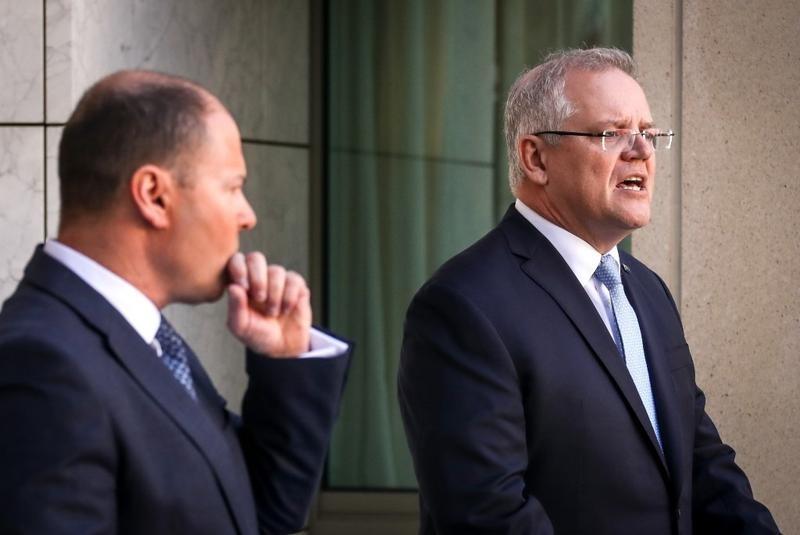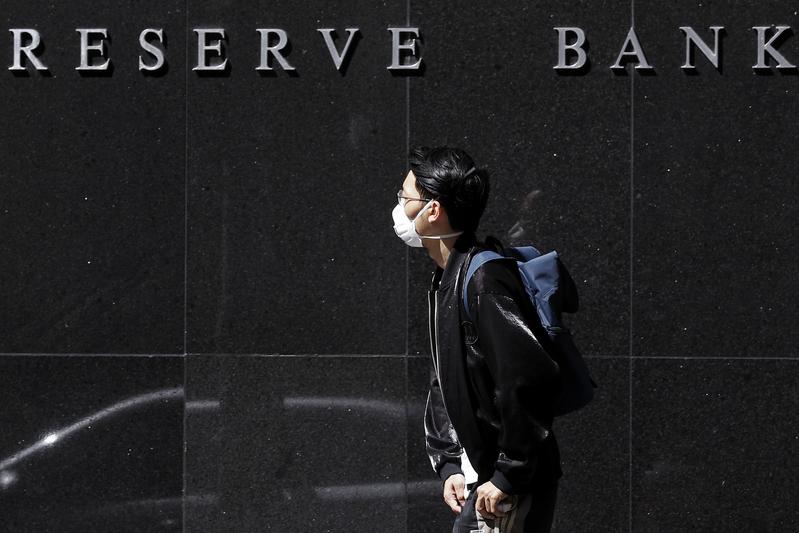 Australian Prime Minister Scott Morrison, right, speaks as he stands with the Australian Treasurer Josh Frydenberg during a press conference at Australia's Parliament House in Canberra, March 22, 2020. Morrison told citizens to cancel any domestic travel plans to slow the spread of coronavirus. (DAVID GRAY / AFP)
Australian Prime Minister Scott Morrison, right, speaks as he stands with the Australian Treasurer Josh Frydenberg during a press conference at Australia's Parliament House in Canberra, March 22, 2020. Morrison told citizens to cancel any domestic travel plans to slow the spread of coronavirus. (DAVID GRAY / AFP)
SYDNEY — On the burning question of whether Australian schools should close as coronavirus cases increase, Prime Minister Scott Morrison was adamant: “Children should go to school.”
Morrison emerged from a special meeting of state and territory leaders on Sunday evening to urge parents to keep children in class, even as non-essential services including restaurants and cinemas shut.
“There is no change in the medical expert advice,” he said.
Yet before school gates opened on Monday, Gladys Berejiklian, premier of the most populous state, New South Wales, was urging parents to keep children at home
Yet before school gates opened on Monday, Gladys Berejiklian, premier of the most populous state, New South Wales (NSW), was urging parents to keep children at home.
Public confidence in Morrison’s leadership was dented by the recent bushfire crisis, according to polls, as state leaders, including Berejiklian, emerged as stronger public voices.
A new rift between Morrison and state leaders over the coronavirus epidemic raises the specter of political volatility in a country that had seen five prime ministers in five years when he took power in 2018.
NSW has the highest number of coronavirus cases, with 669 of Australia’s tally of more than 1,600. A third of students had already stopped attending classes, Berejiklian said, as she urged children to stay away.
“For practical reasons in NSW, we will be encouraging parents to keep their children at home,” Berejiklian told reporters.
A National Cabinet made up of the prime minister, state and territory leaders was formed to forge a united response to the coronavirus, after a summer in which the bushfires saw blame flying between layers of government.
Yet as the number of coronavirus cases climbs, a united public voice is failing to hold.
Decisions in the National Cabinet must be implemented through state regulation. On Monday, as a sense of urgency grew, some states appeared to go their own way.
 A man wearing a mask goes past the Reserve Bank of Australia in Sydney, March 19, 2020. (RICK RYCROFT / AP)
A man wearing a mask goes past the Reserve Bank of Australia in Sydney, March 19, 2020. (RICK RYCROFT / AP)
AT SEA
Victoria, the second largest state, will end the school term early, on Tuesday, while in the Australian Capital Territory (ACT), geographical home of the federal parliament, schools would become “pupil-free” from Tuesday, its authorities said.
“The decision the ACT Government has made is consistent with NSW and Victoria and won’t change. I don’t know why the PM suggested otherwise,” ACT deputy chief minister Yvette Berry wrote on Twitter after Morrison’s Sunday news conference.
ALSO READ: Australia closes pubs, restaurants, casinos as infections soar
Teachers in the northern state of Queensland said they would strike on Wednesday if their state government did not close schools.
States have one by one declared border restrictions to deter interstate travelers. People entering Tasmania, Queensland, the Northern Territory, South Australia and Western Australia must undertake 14 days self isolation.
The public has watched another war of words break out between layers of government over cruise ships carrying ill passengers.
Border Force commissioner Michael Outram told Sky News it was the decision of NSW Health to allow 2,700 passengers to disembark the vessel Ruby Princess in Sydney last week, of which 48 have since tested positive for the coronavirus.
NSW Health Minister Brad Hazzard blamed the “massive inflow of ships” to Sydney after the Morrison government imposed a 30-day ban on cruise ships docking.
Outram said a similar vessel at port in Victoria was not allowed to disembark until passengers had been tested and results were known.
Western Australia, meanwhile, banned the MSC Magnifica from disembarking as 250 out of its 1,700 passengers fell ill, with state premier Mark McGowan saying he didn’t want “what happened in Sydney to happen here”.
READ MORE: Virus: Australia deploys U$38.2b, pledges yet more stimulus
Public confidence in Morrison appears to be wilting, if the queues for toilet paper and groceries are anything to go by. Monday brought more sobering scenes with queues outside social services offices, of people laid off work since the coronavirus crisis blew up, registering for welfare.



